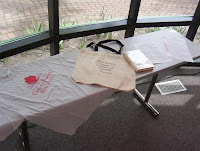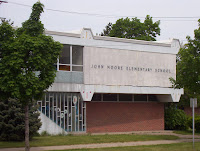
My friends Bob and Ruth Enszer. Bob is retired from teaching chemistry at Arthur Hill High School in Saginaw, and Ruth works at a hospital where she does nursing. I met Bob when I taught chemistry at Saginaw High, the other public high school in Saginaw. Bob retired in 2000. He graciously allowed me the use of his digital camera today. And he bought two of my books. Yay!

Annie Ransford. She teaches English at Caro High School, and she was instrumental in securing the Roethke properties for posterity. She helped to found the Friends of Theodore Roethke Foundation which owns the Carl Roethke and the Otto Roethke homes. She organized the events that we enjoyed today in celebrating the 100th anniversary of Theodore Roethke's birth.

The Andersen Enrichment Center where, for two hours, we read poems by Theodore Roethke. Also, two videos were shown in the Enrichment Center: In a Dark Time which was made in the 60s, and Where Do the Roots Go? which was made in the 90s.

Linda is standing on the left and welcoming folks to the Enrichment Center. Mayor Seals (seated) is enjoying the festive atmosphere with her husband Eugene who just made it into the picture on the right. I taught their son Eugene chemistry at Saginaw High School. Mayor Seals told me her son is now going to be Director of Public Services in Buena Vista.

As you enter the Enrichment Center, you are greeted by the Welcoming Desk full of Roethke poems which are meant to be stuffed in your pockets.

A view from behind the Enrichment Center. The swans are a Marshall Fredericks sculpture. You can see more of them online at the SVSU website.

Tim Ross of Bridgeport. His passion is astronomy; he was looking for sun spots today. Don't know if he found any! He plays guitar & sings too, besides writing poetry.

Dave Romatz, retired English teacher. His wife Wilma is also a retired English teacher. She had with her a video camera from Midland Community Television, the public-access TV station in Midland, Michigan. She was running around getting footage here and there throughout the festivities.

Bill's wife Marie wrote a book of poems which he has in front of him here. Marie read 'Meadow Mouse' in the Enrichment Center after she told us the story of when she was a girl her mother wouldn't let her in the house until she had gotten rid of the mouse she had found.

Poetry people from Michigan State University. The Center for Poetry there is a new thing. Their e-mail is cpoetry@msu.edu. Sorry I don't remember their names better.

Roz Berlin with her mother Agnes' book of poems for sale. That is Tim's guitar next to her.

Marc Beaudoin who has written a novel, a book of poems, and at least one play. He directed the performance of 'Amadeus' at the Pit & Balcony Theater later this same day.

John Palen, a poet, journalist, and retired journalism teacher, among other things. You can find his books at Mayapple Press.

Rachel. She took a lot of pictures with what looked to me like a very nice camera.

Phyllis Hastings, Ph.D. She teaches poetry to inmates at the Saginaw Correctional Facility in Freeland and also to college undergrads at SVSU. In the summer of 2005, Marion and I taught at the correctional facility with her.

Betty van Ochten, a River Junction Poet for several years. She edits our Newsletter now.

Judy Kerman, owner of Mayapple Press. She conducts an informal poetry workshop at Barnes & Noble in Saginaw on the 2nd Monday of each month.

Joe Muenzer, another long-time River Junction Poet. He read a poem by Roethke titled 'Lull,' which was written in 1939. Joe, a retired professor of philosophy at John Carroll near Cleveland, made a few remarks about the poem. It's one of the few in which Roethke even approaches the idea of writing anything remotely political.

Ruth Averill (sp?)

Rosalie Reigle. She's retired from teaching in the English Department at SVSU, and she lives near Chicago now. She worked at the Mustard Seed Catholic Worker house in Saginaw, which was later renamed the Jeanine House.

Roz Berlin, another River Junction Poet. Retired from teaching art in public schools.

Ron Maxwell read 'The Bat.'

Marie read 'Meadow Mouse.'

Pat Yockey, an artist and a poet.

Lisa.

Stephen (Steven?) read the first part of 'The Lost Son' after sharing with us that he walked to Saginaw from Toledo after reading a few Roethke poems in a public library there. Nice pilgrimage.

Marion Tincknell, latest and greatest recipient of Saginaw's All-Area Arts Award. She is a founding member of the River Junction Poets and remains a pillar of our community as well as, with her husband Les, the greater Saginaw community.

Arts Activist Al Hellus. For ten years or so he organized Saginaw's Poetry Slams, and for ten years he organized the annual Rouse for Roethke in which volunteers read all of Roethke's poems (an event which takes about six hours to complete). He has a new book of poems out by Ridgeway Press.

Carol Lopez, former Treasurer for River Junction Poets.

Jim Piazza, an attorney in Saginaw.

Carnations provided by? There are three more like these on the other side of the podium.

Some of my stuff. The t-shirt says 'Center for Poetry;' the tote bag says, 'What we need is more people who specialize in the impossible,' and underneath that it says Theodore Roethke and then underneath that it says PoetsHouse. The book is Straw for the Fire, and the posters indicate events in Lansing next Fall.

After reading poems for two hours in the Enrichment Center, we headed up to the apex of the Court Street bridge for a few more poems. Annie is walking next to the car; her daughter is driving. Mayor Seals is reading 'The Saginaw Song,' and Marion is in the passenger seat.

Les Tincknell, on the left, designed the Andersen Enrichment Center. That worked out well since he's an architect. Tom Lynch, on the right, is a writer and an undertaker in Michigan. He read a few Roethke poems on the bridge with us.

Annie read two or three poems as well. One she read to her daughter but I don't remember which one. It mentioned an old maid though.

The Court Street bridge as seen from a bank of the Saginaw River.

A closer look at the bridge. See those wooden pylons sticking up in front of the concrete supports? I'd like to have small ones like that in my yard. I'd connect the tops of them with thick rope.

Roethke went to elementary school at John Moore Elementary, but it wasn't this one. The one he went to was at another location in Saginaw. This one was built in the 60s.

Across the street from the John Moore Elementary School is the First Presbyterian Church. This is where the Roethke's went to church. Ted took his sister June to Sunday School until it was nearly time for him to go to college.




This marker is in front of the Otto Roethke House.

This is the other side of the marker.

The Carl Roethke House.


The Otto Roethke House.


The Carl Roethke House is on the left and the Otto Roethke House is on the right.

The entrance to the Oakwood Cemetery where the Roethkes are buried.


Otto Roethke's gravestone.

Helen Roethke's gravestone.

Theodore Roethke's gravestone.

June Roethke's gravestone.

The Roethke Family gravestones.

Two big oak trees near the entrance to the Oakwood Cemetery.
All these pictures I took myself on the day of this celebration of Roethke and his poems.































